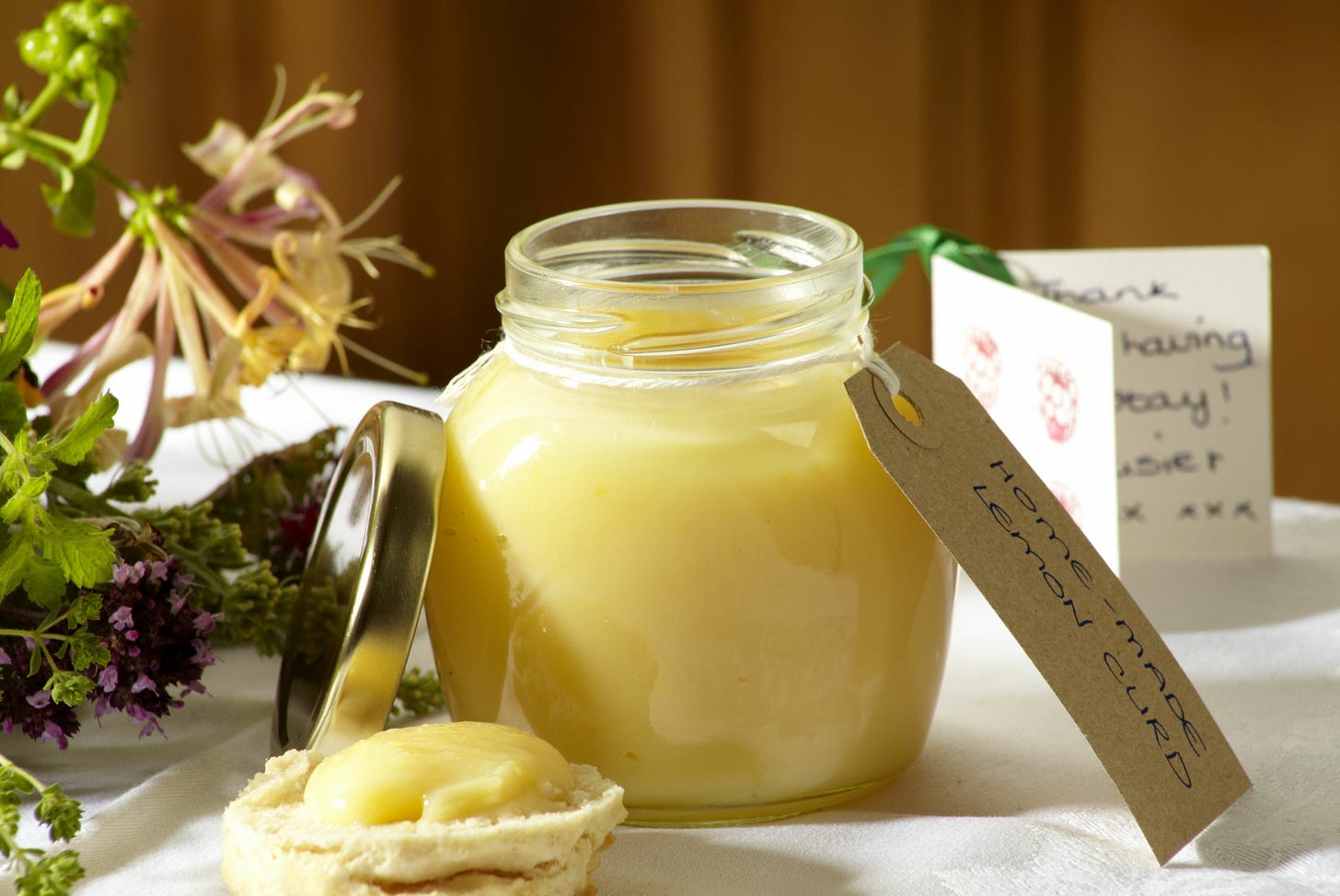Fresh Lemon Curd. The Easter treat that surpasses all chocolate offerings in my book. As we know, Easter usually heralds an upturn in the weather, longer daylight hours, and babies being born everywhere. In the olden days ( when I was young ) there were no eggs all year round in supermarkets - there were no supermarkets. Everyone understood that with the failing light of Autumn the hens would cease to lay and would spend their Winter semi-hibernating and keeping warm. Their bodies could not take in enough energy by way of food to survive the Winter, keep warm and lay eggs and grow new chicks.
All households knew that if you needed year-round eggs they had to be preserved. I have recipes and methods for this in the video library of The School and I use calcium hydroxide, which also happens to be one of the main ingredients in cement. In the correct amount it preserves fresh eggs beautifully for at least a year with no other processing required. When you are ready to use just remove what you need and leave the rest in the solution. They can replace a fresh egg for any use.
You can butter the shells - I haven’t tried this yet - quite a messy, slippery, method but apparently has the added bonus of giving the eggs a lovely buttery flavour. Beat the yolks and whites together and freeze in portions is another method but not an ambient temperature solution. Eggs actually keep for quite a few weeks anyway and I never put them in the fridge. I also scramble them without seasoning or butter, then dehydrate into a powder which will reconstitute quite well but obviously won’t then make a fried or poached egg.
When I was young my mother had an enamel bucket with a lid which she filled with the last eggs laid by her hens in the Autumn. As each layer was added she covered them with an isinglass solution, and carried on until the bucket was full. These were then used during the Winter to replace the fresh eggs. I hated them. They gave a very dry, chalky feeling to your teeth which, even today, gives me a slightly queasy feeling recalling it. Needs must though I suppose.
The point is, that where ever you looked in the Spring there were babies, there were new eggs, the cows had lots of milk after calving so plenty of butter, cream, curds for tarts - and I guess it also explains why there were so many products from New Zealand in the 50s household as they had the opposite seasons to UK and filled the gaps.
It was natural therefore, that the biggest celebration in the Christian calendar, Easter, gave rise to an Easter Tea, especially on the farms around the country, using all of these abundant ingredients which had made a welcome return. Much like the pagan offerings to the various deities to ensure a safe harvest, giving thanks for what they had had in the hope that there would be more to come.
Fresh Lemon Curd made with butter and eggs, sugar and a prized exotic lemon would not have been made as a preserve but as an unbelievably delicious treat to be totally consumed at one sitting. Farming families were invariably large and there would have been no leftovers. It always makes me smile today when I am asked how to ‘keep it for longer’. The recipe is modest, it is not designed to be kept. It will keep for up to six weeks if refrigerated ( or slightly longer if you are both strong willed and have the appetite of a mouse.) It is so quick and easy to make that I see no point in trying to keep it.
You can make it in about 10 minutes from start to finish using the microwave or in about twice that time using a bowl over a pan of hot water. Either produce the same result so get the four ingredients together and give it a go. If you have been invited somewhere for Easter make and take as a gift - search the charity shop for a pretty pressed glass bowl to pour the curd into, put into a basket with some freshly made scones and a few Spring flowers to delight your host. Much more acceptable than a commercially produced chocolate egg.
Here’s what you need:-
Caster Sugar 3 oz/75 g
Lemon 1 each
Butter Salted or unsalted, cut into small cubes 2 oz/50 g
Eggs Large free range 2 each
Place the sugar into a bowl and grate the zest of the lemon onto the sugar
Beat the eggs together in a separate bowl, squeeze the juice of the lemon and add to the eggs, mix thoroughly
Pour the egg mixture through a sieve onto the sugar and zest
Add the butter to the bowl and mix together
Microwave on half power, if possible in short bursts, until mixture thickens. Generally speaking do 1 minute on half power, stir, repeat a couple of times and then go onto 30 sec bursts on half power, stirring in between.*
How long it takes to thicken will depend on your microwave, but it is usually no more than 5 minutes total.
You don't want to end up with lemon flavoured scrambled egg so BE PATIENT! The mixture should just coat the back of a spoon when ready - it will thicken as it cools
Use to sandwich a sponge cake, stir through vanilla ice cream - make Eton Mess with lemon curd and banana instead of the strawberries - luscious
*If you prefer not to microwave, place a heatproof bowl over hot water in a pan on medium heat. Stir constantly until the mixture thickens, then remove from the heat and carefully remove the bowl from the pan.
This quantity will make around one medium sized jar. Fill jar to the top and put on the lid. Allow to cool and then store in the fridge for up to six weeks. The recipe will happily double or triple if you need a bigger quantity.





